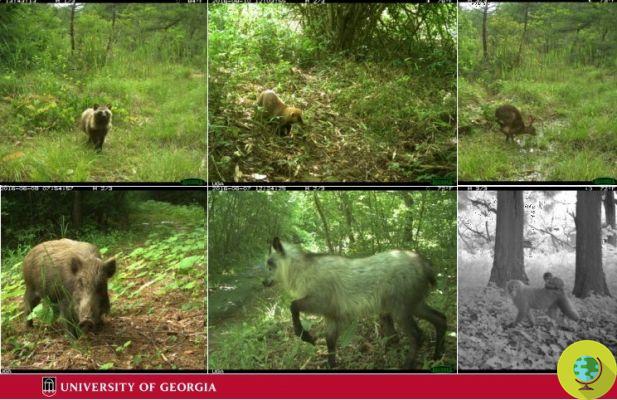
A new study will long-term monitor the devastating effects of the Fukushima nuclear disaster on the area's flora and fauna
He is about to end up run over, his mother saves himFukushima, has anyone ever thought about the damage that the nuclear disaster connected to the earthquake in Japan, have caused on animals? After the heartbreaking investigation published on CNN that opened to the world the fate to which dogs, cats, pigs, cows and other animals were abandoned after the evacuation, the latest to question the broader question of local flora and fauna, was Professor Timothy Mousseau dell 'University of South Carolina, which has assembled a team that will conduct long-term research into the effects of radiation exposure to animals and wild plants of the Fukushima area.
According to reports from theirishtimes, researchers working in the disaster-stricken area around the Fukushima power plant reported that the populations of birds have already decreased substantially, and this could be a chilling omen of what could happen in a few years, not only on flora and fauna but also on the local population.
According to the study based on the effects of nuclear contamination linked to Fukushima by an international research team consisting of Japanese, American and Danish scholars, the analysis of 14 common bird species both Fukushima and Chernobyl confirmed what we already suspected: the effect of the disaster, at least in quantitative terms, is far worse than the first estimates made. This was also confirmed by a well-known Japanese channel, NHK.
Furthermore, according to the IrishTimes, the research results unequivocally show that there will be "immediate negative consequences related to radiation on birds during their breeding season, between March-July".
The two principal researchers, Professor Timothy Mousseau dell 'University of South Carolina, Anders Pape Moller, have already worked in Chernobyl to assess the damage of the other nuclear disaster that has devastated the history of man. Therefore, they are profound connoisseurs of the problem. Again, as in Fukushima, what the two experts noticed was one reduction of longevity in birds, impaired male fertility and reduced brain size.
Furthermore, many species, now as then, show "dramatically" high rates of DNA, together with anomalies in development, and cases of extinctions to which must be added a reduction in the life expectancy of insects.
But some scientists seem to disagree with the results these scholars have come up with, arguing that animal species and insects have continued to live in the area. Chernobyl.
But the biologist Mousseau defended himself by arguing that "there is no data to support this thesis" and that Fukushima is the first useful opportunity to monitor the environmental impact of a nuclear disaster of this magnitude from "the first day".
I Japanese researchers, in fact, from the very first moment they began to observe the impact of the accident, on flora and fauna "by examining the field mice, red pine trees, a certain type of molluscs and other wild species within a radius of 20 kilometers ".
The results of their research will be published in March, while the research conducted by Mousseau will be published next week on environmental pollution.
Francesca Mancuso


























